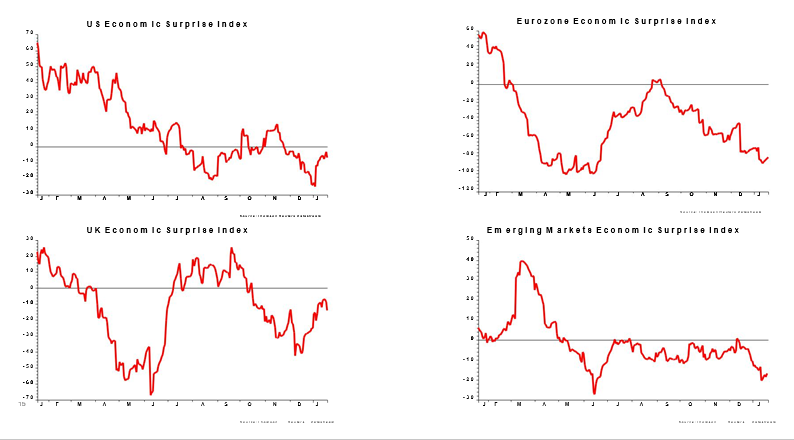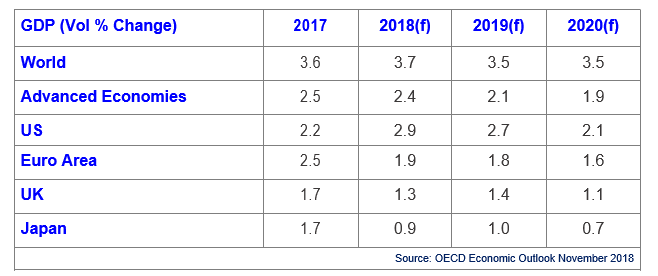Many concerns about the economic outlook
- Global Trade: Move away from free trade towards protectionism\tariffs under Trump Slower growth in global trade, weaker export orders, US tariffs impact Chinese economy
- US Economy: Growing strongly but could slow sharply as fiscal stimulus fades and higher interest rates impact activity. Will become the longest US economic expansion on record by June this year
- Political Uncertainty Across Europe: Rise in populism, nationalism, anti-immigration, EU scepticism, divisions between older & newer EU states, Italian budget row, German political change
- Brexit: Still much uncertainty still about what shape Brexit will take in 2019 in divided UK
- Emerging Economies Wobble: Rising US dollar/rates & domestic issues expose weaknesses and rattle confidence in some big emerging economies – Argentina, Brazil, Turkey, S Africa, Indonesia
- Nervous Financial Markets: Much more volatility in financial markets, with increased risk aversion amidst greater uncertainty and weak stock markets. Lower oil prices
Economic data weaker than expected everywhere in recent months, especially Eurozone…

…growth forecasts for 2019-20 are cut

- IMF/OECD cuts global growth forecast for 2019 to 3.5% from 3.9% at mid-year
- Loose monetary policies, more expansionary fiscal policies and rising real incomes are helping to support activity
- Inflation remains subdued, allowing central banks to keep rates very low
- Downside risks, though, are mounting, with lead indicators weakening. Eurozone and UK forecasts, in particular, look optimistic
Focus on logjam in UK Parliament
- The UK’s pro-EU parliament has begun to assert itself. Evident in the rejection of Withdrawal Agreement There is strong opposition in Parliament to a ‘no deal’ hard Brexit.
- However, Parliament is finding it very difficult to reach agreement on what type of deal it wants in order to prevent this.
- There is no clear consensus for other alternatives, from the WA, to a ‘Norway style plus’ close economic relationship with the EU, or a second referendum (would require an extension to the Article 50 deadline, currently set for 29th March).
- As a result, there is a real risk in the current parliamentary stalemate of any Brexit option being unable to command majority support.
- Therefore, a ‘no deal’ hard Brexit scenario cannot be ruled out, as this is the default position under UK law in these circumstances
- The official EU line is that there is very little scope for changes to the already agreed legal text of the WA. However, EU sources have suggested that the EU is open to extending the Article 50 deadline
- Political Declaration could be nuanced
What happens next ?
- PM May will try and get further assurances from the EU that the ‘Irish backstop’ is temporary, while at the same time trying to build support for the WA.
- It is expected that some MPs will try and forge a cross-party consensus around a ‘softer’ Brexit that might be able to command majority support in parliament
- Despite the heightened uncertainty amid the parliamentary impasse, markets are so far unperturbed.
- The real backstop for markets is their expectation that the pro-EU UK parliament will prevent a no-deal Brexit.
- At a minimum, the UK is likely to seek and be granted an extension to Article 50, delaying Brexit






